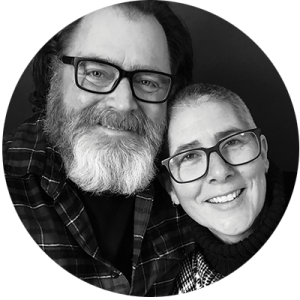Sex is a natural part of life, but it can be taboo and awkward to talk about for anyone. This is doubly true for sex and disability. Our sexuality impacts so many aspects of our life. Sex can impact our biology, psychology, spirituality and culture. Living with a disability can also impact many of these same aspects of your life. Sex is not necessarily better, worse, or non-existent after an SCI, but it is different. Exploring this new world can be daunting but knowing that others have been through this journey and willing to share their experience can be a comfort.
I speak with three couples about their sex life as it pertains to their spinal cord injury and I ask each to describe difficulties they have faced and hurdles they have overcome.
“After his injury, our sex life was different, obviously. There was a lot of learning and experimenting. The biggest change was the rerouting of the sensitive spots and the difference in orgasm.”
– Samantha
Atam & Samantha
Atam has complete quadriplegia at the C6 level. He was injured in 2012 after falling from a roof during a construction job. He is currently a social media influencer, vlogger, and motivational speaker who enjoys speaking to young kids about his story and journey.
Samantha is a Toronto native who drives for food delivery services UberEats and DoorDash. She has a long history in the service industry and loves interacting with people.
Atam (35) & Samantha (34) are an inter-abled couple that have been together for 14 years.
Atam says, “My biggest hurdle to overcome was expectations. My expectations and my partners expectations. Specifically, like, I am talking about expectations as to what sex is. It’s not always what you see on the media. Even the reward for sex – the orgasm – it is different for me now. I have had to shift my expectations. We both did.”
 Samantha adds, “After his injury, our sex life was different, obviously. There was a lot of learning and experimenting. The biggest change was the rerouting of the sensitive spots and the difference in orgasm.”
Samantha adds, “After his injury, our sex life was different, obviously. There was a lot of learning and experimenting. The biggest change was the rerouting of the sensitive spots and the difference in orgasm.”
Atam says, “I don’t necessarily have the same type of orgasm as before. It’s different now, but it is still enjoyable, because I shifted my expectations. At first I thought I couldn’t have an orgasm and sex was pointless beyond my enjoyment of giving pleasure to my partner.”
Samantha adds, “But after we had that conversation, we tried different things, we introduced sex-toys to our sex, we purchased an Intimate Ryder, and eventually we figured out what gives him pleasure.”
Atam & Samantha’s journey is one of forgiveness, understanding, communication and experimentation.
Jackie & Jennifer
Jackie is originally from New England in the US and currently resides in Vaughan, Ontario. She has an MFA in Creative Writing from New England College. She is a young professional in the publishing industry and has no interest in writing her own work; she went to college for creative writing and quickly found out that she liked critiquing, editing, and refining other people’s works.
Jennifer is a visual artist originally from Montreal. She graduated with an MA in Art Education from Concordia. She has incomplete paraplegia at the C7/T2 levels. She is currently selling her art, trying new teas, and raising her two fur-babies Jax and Pickle.
Jackie (32) & Jennifer (28) are a same-sex couple that have been together for 5 years. They met through an online dating app 8 months after Jennifer was injured in a car accident.
Jennifer says, “After finding out my injury level, I thought my life was over. Especially my sex life. I’m a very physical and touchy-feely person.” She goes on, “I was lucky to meet someone like Jackie so soon after my injury. She is my first relationship post SCI. Dating is hard for anyone, but especially when you are LGBT and disabled.”
Jackie adds, “I had a lot to learn, I won’t lie. I even had misunderstandings and assumptions I had to reign in and check! I realized I assumed and didn’t understand a lot, I guess we all do that towards things we don’t understand. Jen has been a good teacher.”
Jennifer says that her biggest hurdle was accepting and discovering her own body after her spinal cord injury, “It was hard adjusting to my new body at first. Not being able to do the things I used to do. I couldn’t feel the way I used to. My biggest challenge was accepting myself and exploring my body within its new limitations. The thing is, I never really masturbated before my injury, I thought of it as something that shouldn’t be done… but I decided it was pivotal for me, personally, to practice self-love and explore my body through masturbation. I needed to understand my body and it was in that way I found my new erogenous zones. For example, my ear lobes, my lips and my eyebrows.”
Jackie adds, “I believe her masturbation was important in how she communicated with me about what she liked and what she wanted to do. I find it sexy that she is exploring her body and relearning these things and allowing me to come on this journey.”
Jackie & Jennifer’s journey is one of love and self-love.
Wallace & Melanie
 Wallace has a Master of Social Work degree and is a Registered Social Worker. He is currently working as a Clinical Research Associate with a focus on spinal cord injury (SCI). He has a spinal cord injury at the T6 level.
Wallace has a Master of Social Work degree and is a Registered Social Worker. He is currently working as a Clinical Research Associate with a focus on spinal cord injury (SCI). He has a spinal cord injury at the T6 level.
Melanie Earle has a Bachelor of Arts degree with a double major in English and Women’s Studies.
Wallace (52) & Melanie (49) are an inter-abled couple that have been together for 4 years.
Their attitude toward sex as an inter-abled couple is an open and healthy one. They both are happy to be in a relationship that is loving and built upon trust and communication. They feel this foundation has allowed their sex life to flourish like never before and without limitations—whether it be physical, mental, or social.
One common misconception is that sex is specifically about penetration. When this thought is ingrained in our thinking, it can be hard to reconcile with erectile dysfunction due to SCI. And, as Wallace has experienced, sometimes medications that treat erectile dysfunction cause troubling side effects.
Wallace says, “when I was younger, I worried about what is this person going to think if we’re not going to have intercourse? So, the hurdle was within myself. To realize I don’t want to be in a relationship where I can’t be comfortable with who I am and where I have to worry about that.”
Melanie adds, “what we have is the best sex life and will continue to get better; it’s a lot to do with openness and the communication we have.” She goes on, “There are people who find out I’m dating a paraplegic and look at me as if I’m giving up or sacrificing something, like poor me, but no, they don’t get it, because it goes against the norm.”
Wallace & Melanie’s journey is one of patience, love, communication, and acceptance.
The importance of communication has brought Wallace and Melanie to create a platform for members of the SCI community. Together they are using their knowledge, skills and experience to keep the conversation going with their peers. There is a vast amount of untapped peer knowledge and experience out there. They would like to gather these resources and share it as a means of serving those within (and outside of) the SCI community. They created www.t6talk.com to dispel myths, illuminate truths and share as a community.
Wallace and Melanie are also joining SCIO to help start the conversation for others by facilitating a webinar series. SCI and Intimacy is a three-part series. In the first webinar we will explore myths and misconceptions about sex and sexuality. In the second part we will discuss the importance of communicating with yourself and others regarding the topic of intimacy. Finally, they will lead a discussion on such as self-exploration, erogenous zone relocation, sex (with self and others) …and orgasm.
To learn more and register go to www.sciontario.org/events






